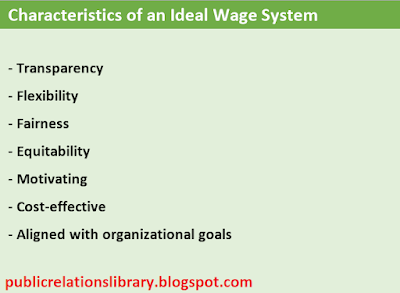An ideal wage system is
one that is fair, equitable, and meets the needs of both the organization and
its employees. Here are some of the key features of an ideal wage system:

- Transparency: An ideal wage system should be
transparent, with clear and straightforward pay structures, so that
employees understand how their wages are determined.
- Flexibility: An ideal wage system should be
flexible, allowing for adjustments based on changes in the organization or
the economy.
- Fairness: An ideal wage system should be
fair, taking into account factors such as experience, skill level, and
performance, and providing equal pay for equal work.
- Equitability: An ideal wage system should be
equitable, providing all employees with comparable pay and benefits,
regardless of their position or seniority.
- Motivating: An ideal wage system should be
motivating, encouraging employees to work hard and improve their
performance, while also rewarding their achievements.
- Cost-effective: An ideal wage system should
be cost-effective, allowing the organization to pay its employees fairly
and equitably, while also remaining financially sustainable.
- Aligned with organizational goals: An ideal
wage system should be aligned with the goals of the organization, ensuring
that the wages and benefits offered to employees support the
organization's strategic objectives.
In conclusion, an ideal
wage system is one that is transparent, flexible, fair, equitable, motivating,
cost-effective, and aligned with the organization's goals. By offering a wage
system that meets these characteristics, organizations can ensure that they are
paying their employees fairly and equitably, while also promoting a positive
and motivated work environment.